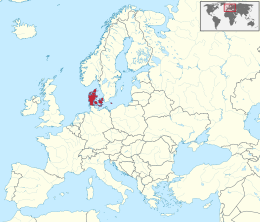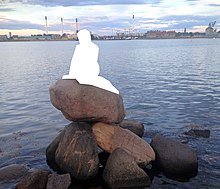Commons:Copyright rules by territory/Denmark/mk
|
Авторскоправни правила: Denmark Кратенка: COM:DENMARK | |
 | |
 | |
| Времетраење | |
|---|---|
| Стандардно | Life + 70 years |
| Анонимни | Create/Publish + 70 years |
| Аудиовизуелни | Life + 70 years |
| Други | |
| Слобода на панорама | For buildings |
| Чести лиценцни ознаки |
{{PD-Denmark}} {{PD-Denmark50}} {{PD-DenmarkGov}} |
| Договори | |
| Бернска спогодба | 1 July 1903 |
| Член на СТО | 1 January 1995 |
| Датум на УРАА* | 1 January 1996 |
| Договор на СОИС | 14 March 2010 |
| *Едно дело обично ужива заштита во САД ако подлежи на авторски права во земјата, е објавено по 31 декември 1928 г. и заштитено во земјата на потекло со датумот на УРАА. | |
This page provides an overview of copyright rules of Denmark relevant to uploading works into Wikimedia Commons. Note that any work originating in Denmark must be in the public domain, or available under a free license, in both Denmark and the United States before it can be uploaded to Wikimedia Commons. If there is any doubt about the copyright status of a work from Denmark, refer to the relevant laws for clarification.
Governing laws
Denmark has been a member of the Berne Convention since 1 July 1903, the World Trade Organization since 1 January 1995 and the WIPO Copyright Treaty since 14 March 2010.
As of 2018 the World Intellectual Property Organization (WIPO), an agency of the United Nations, listed the Consolidated Act on Copyright (Consolidated Act No. 1144 of October 23, 2014) as the main IP law enacted by the legislature of Denmark.[1] WIPO holds the text of this law in their WIPO Lex database.
This Act does not extend to the Faeroe Islands but may by Royal Ordinance be brought into full or partial operation in the Faeroe Islands, subject to such modifications as required by the special conditions obtaining in the Faeroe Islands.[1144/2014 Art.93] The act does apply to Greenland with minor modifications. The Compendium of Cultural Policies and Trends provides a commentary on Danish copyright law.
General rules
Under the Consolidated Act No. 1144 of 23 October 2014,
- The copyright in a work lasts for 70 years after the year of the author’s death, or with joint works for 70 years after the year of death of the last surviving author.[1144/2014 Art.63(1)]
- With cinematographic works, copyright lasts for 70 years after the year of death of the last survivor of the principal director; the author of the script; the author of the dialogue; and the composer of music specifically created for use in the cinematographic work.[1144/2014 Art.63(1)]
- Copyright of a musical work with lyrics where both lyrics and musical work have been created specifically for the work in question lasts until 70 years have passed from the year of death of the longest-living of the author and the composer.[1144/2014 Art.63(2)]
- Where a work is made public without indication of the author’s name, generally known pseudonym or signature, copyright lasts for 70 years after the year in which the work was made public.[1144/2014 Art.63(3)]
- Copyright in a work of unknown authorship that has not been made public lasts 70 years after the end of the year in which the work was created.[1144/2014 Art.63(5)]
Photographs
Under the Consolidated Act No. 1144 of 23 October 2014,
- The person creating a literary or artistic work shall have copyright therein, be it ... a cinematographic or photographic work ...[1144/2014 Art.1(1)]
- The rights in a photographic picture shall last until 50 years have elapsed from the end of the year in which the picture was taken.[1144/2014 Art.70(2)]
- If a photographic picture is subject to copyright according to section 1, this right may also be exercised.[1144/2014 Art.70(3)]
- The provision of this law (Section 70) shall not apply to photographic pictures made before 1 January 1970,[1144/2014 Art.89(5)] that is, such pictures are covered by the previous law from 1993, which specifies protection tern of 25 years after the end of the year in which the image was produced.[1]
The definition of a photographic work, as opposed to image is not precisely defined. However Peter Schønning, a Danish copyright lawyer, states that for a photograph to be a photographic work it must display "the author's own intellectual creation and reflects his personality". Lacking actual court decisions however, interpretation is still subjective.
- On Commons Commons:Deletion requests/File:Aage Bohr.jpg concluded, that it was too simple to be considered photographic work.
- The same was decided in Commons:Deletion requests/File:Peter Martin Madsen (Halsted) by Julius Folkmann.jpg
- Commons:Deletion requests/File:HOLange2.jpg on a portrait photo of a man sitting with a book in a certain stance was concluded being a photographic work.
Maps
Certain maps produced by the Danish government in 1814 or later are subject to perpetual copyright.
This is covered by section 92 of the Danish copyright law. Currently, all maps made by da:Det Kongelige Søkort-Arkiv in 1814 or later, all maps made by da:Generalstabens topografiske Afdeling in 1831 or later and all maps made by their successors remain copyrighted in Denmark. The rights currently belong to da:Styrelsen for Dataforsyning og Effektivisering.
Not protected
Видете исто така: Commons:Unprotected works
Under the Consolidated Act No. 1144 of 23 October 2014: Acts, administrative orders, legal decisions and similar official documents are not subject to copyright. This does not apply to works appearing as independent contributions in these documents, but such works may be reproduced in connection with the documents.[1144/2014 Art.9]
Ознаки за слики
Видете исто така: Ризница:Авторскоправни ознаки
- {{PD-Denmark}} – for "photographic works of art" in the public domain according to Danish law.
- {{PD-Denmark50}} – за „фотографски слики“ во јавна сопственост согласно со данските закони. Note that „фотографски дела“ влегуваат во јавна сопственост дури 70 години по смртта на нивниот создавач.
- {{PD-DenmarkGov}} – for "acts, administrative orders, legal decisions and similar official documents," but not "works appearing as independent contributions in the [aforementioned] documents."
- {{DGA map}} – for media in either full extent or partially based in Danish Geodata Agency open public geographic data. This tag does not preclude use of other copyright tags.
- {{Statistics Denmark}} – for media in either full extent or partially based on information from Statistics Denmark. This tag does not preclude use of other copyright tags.
- {{PD-DK-expired}} – for works where all authors have been dead for 70 years, which is the maximum amount of copyright allowed according to the 2023 law.
Currency
Видете исто така: Ризница:Валута
![]() Не е во ред. The National Bank of Denmark states:
Не е во ред. The National Bank of Denmark states:
- Danmarks Nationalbank regularly receives requests from firms and private individuals about reproduction of banknotes and coins. Any reproduction of money should always be considered carefully since it is a criminal offence to imitate and/or copy money in such a way they can be mistaken for genuine money. Moreover, Danmarks Nationalbank's copyright to the banknote and coin designs must be respected.
Freedom of panorama
Видете исто така: Ризница:Слобода на панорама

 Во ред for buildings only: {{FoP-Denmark}}
Во ред for buildings only: {{FoP-Denmark}} Не е во ред for any public art still in copyright: {{NoFoP-Denmark}} (category-only template)
Не е во ред for any public art still in copyright: {{NoFoP-Denmark}} (category-only template)
Under the Consolidated Act No. 1144 of 23 October 2014,
- Buildings may be freely reproduced in pictorial form and then made available to the public."[1144/2014 Art.24(3)]
- Works of art may be reproduced in pictorial form and then made available to the public if they are permanently situated in a public place or road. The provision of the first sentence shall not apply if the work of art is the chief motif and its reproduction is used for commercial purposes."[1144/2014 Art.24(2)]
The famous statue of The Little Mermaid by sculptor Edvard Eriksen (1876–1959) is protected by copyright until 2029[8], and pictures where it is the main motif cannot be used for commercial purposes.[9]
Stamps
There appears to be no specific provision in the law for stamps and there are no special rules for works created by the government. So stamps are copyrighted following the normal terms of Life + 70 years after the death of the artist or Create/Publish + 70 years if they are created anonymously.
Threshold of originality
Видете исто така: Commons:Threshold of originality
| Status | Example | Notes |
|---|---|---|
 |
Three fonts not eligible for copyright protection (Supreme Court 30 June 2006, U2006.2697H). Two other fonts were found eligible for copyright. | |
 |
Sketches of windows and doors not eligible for copyright protection (The Maritime and Commercial Court 8 August 2003.)[10][11] | |
 |
The WWF panda logo is not protected by copyright[12] | |
 |
The GLOBAL knife design is copyright protected in Denmark.[13] | |
 |
A specific chair design (Tripp Trapp).[14] |
See also
- Danmark
- Category:Danish FOP cases
- Category:License tags of Denmark
- Commons:Copyright rules by territory/Faroe Islands/mk
- Commons:Copyright rules by territory/Greenland
Citations
- ↑ a b Denmark Copyright and Related Rights (Neighboring Rights). WIPO: World Intellectual Property Organization (2018). Retrieved on 2018-11-11.
- ↑ Consolidated Act on Copyright (Consolidated Act No. 1144 of October 23, 2014). Denmark (2014). Retrieved on 2018-11-11.
- ↑ Denmark/ 5.1 General legislation. Compendium of Cultural Policies and Trends. Retrieved on 2019-02-10.
- ↑ Plakat ang. efterstikning af topografiske kort. retsinformation.dk. Retrieved on 2019-02-10.
- ↑ Plakat ang. efterstikning af søkort. retsinformation.dk. Retrieved on 2019-02-10.
- ↑ Reproduction of banknotes and coins. Danmarks Nationalbank. Retrieved on 2019-03-24.
- ↑ Wikipedia:Landsbybrønden/Forespørgsel til Danmarks Nationalbank (Landsbybrønden / Inquiry to Danmarks Nationalbank)
- ↑ Strid mellem dagblad og arvinger til Den lille havfrue er slut: 'Afgørelsen er utrolig vigtig', Danmarks Radio
- ↑ Jakob Kehlet (30.07.2007). Havfruens arvinger tjener fedt på ophavsret (in Danish). Journalisten. Retrieved on 2019-03-24.
- ↑ V-74-01 Jydsk Vindueskompagni mod Bering Byg (pdf). Retrieved on 17 April 2020.
- ↑ 3 February 2004 (V 98/01))
- ↑ Sø- og Handelsretten (The Maritime and Commercial Court) in March 1998, U 1998:946 S and NIR 69:3, p. 413-418 [2000]
- ↑ Violation of the copyright of the Global Knife Series. Supreme Court (19-09-2011). Archived from the original on October 9, 2015. Retrieved on 2019-03-24. "Det var for Højesteret ubestridt, at Global-knivene er ophavsretligt beskyttet i medfør af ophavsretslovens § 1. Højesteret udtalte, at Global-knivene som brugskunst er beskyttet mod meget nærgående efterligninger. Højesteret fandt, at Royal-knivenes design ikke indebar en tilstrækkelig frigørelse fra det særegne ved Global-knivenes udformning, men måtte anses som en meget nærgående efterligning. (It was undisputed to the Supreme Court that the Global blades are protected by copyright under section 1 of the Copyright Act. The Supreme Court stated that the Global blades as a utility art are protected from very close imitations. The Supreme Court found that the design of the Royal blades did not sufficiently differ from the distinctive nature of the design of the Global blades, and had to be regarded as a very close imitation."
- ↑ Infringement of the Copyright Act Case 306/2009. Supreme Court (28-06-2011). Retrieved on 2019-03-24.